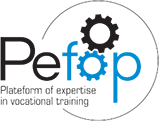Pefop: development of specialized expertise for TVET in Africa
In 2015, IIEP-UNESCO Dakar received funding for four years from the French Development Agency (AFD) to develop a Platform of expertise in vocational training: Pefop.
Through the Pefop program, IIEP-UNESCO Dakar has developed specialized expertise to support the operationalization of reformed vocational training policies, by contributing to the mobilization, strengthening and better tools of public actors (State , public authorities and public vocational training structures) and private (actors of the formal and non-formal economic sector and their organizations, unions, NGOs and private vocational training structures) involved in their implementation.
“Revised policies” must be based on public-private partnerships, and:
- Ensure training is steered according to the needs of the economy,
- Manage the process of endorsement of skills geared to employment and integration,
- Provide equity in and access to training, by accepting diverse individual backgrounds, and through the decentralization of supply,
- Establish lasting and sustainable financing mechanisms.
To achieve its objective, IIEP-UNESCO Dakar has supported, through its Pefop, the experimentation of new methods and new diagnostic tools, access to references and information that can be useful to stakeholders and the organization. exchanges between them. It also promotes innovation, the capitalization of experiences, the sharing and pooling of good practices and resources in vocational training.
Pefop was implemented through three complementary components:
This first component aims to contribute to the effective operationalization of reforms in vocational training policy in African countries embarked on a process of renewal of their current mechanisms.
In the first phase, launched in 2015 with AFD financing, four West-African countries (Burkina Faso, Côte d’Ivoire, Mauritania and Senegal) benefitted from PEFOP’s early support. The methodology developed in the context of these first support programmes was capitalized in such a way as to be available to other countries sharing the same need.
PEFOP’s support is consolidated in a so-called Programme Contributing to the Operationalization of Reforms (PROCOR) that focuses on the priorities identified by stakeholders in beneficiary countries with the support of the IIEP-UNESCO Dakar, following a participatory analysis of constraints to the implementation of reforms.
A PROCOR is a programme document, combining a set of sector or area action plans to overcome the constraints considered to be priorities by national stakeholders.
This second field of work aims to provide an answer to the need for dialogue and to share experiences in vocational education, among stakeholders and across countries.
For this, PEFOP has capitalized the lessons learned from its support programmes to share them beyond the four beneficiary countries, facilitating access to information on vocational education and supporting the creation of networks among players for them to share their experiences.
This component of PEFOP’s work, complementing the first two, addresses the stake of encouraging innovation and experimentation in vocational training, as well as promoting debate about new approaches and their capitalization.
Practices deemed innovative in the light of progress in vocational education policy will be identified, receive financial support and be publicized.

